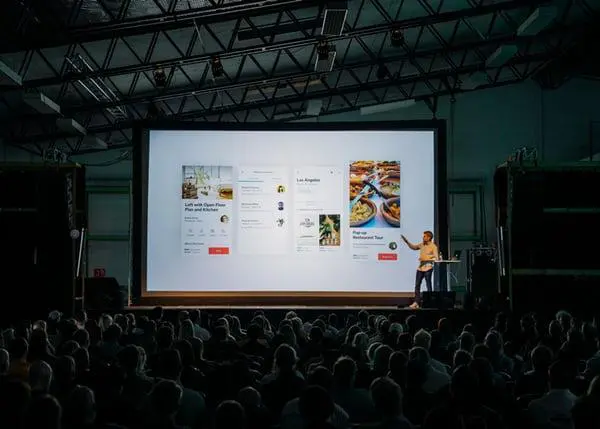Synthèse
The video conferencing market has experienced rapid growth, especially in the wake of the COVID-19 pandemic which has significantly boosted the industry. Globally, the market was valued at $3.85 billion and is projected to reach $8.19 billion by 2027, growing at a CAGR of 9.9%. The shift towards cloud services is a notable trend, offering greater accessibility and connectivity, as well as cost savings with the advantage of deploying SaaS video conferencing solutions.
In France, the market size stood at $207.24 million. Consumers show a preference for high-quality video calls and ease of use when choosing software providers. The supply side is evolving with software becoming more central as cloud services develop, with 64% of large companies in the US using Skype for Business and 72% of smaller companies preferring Zoom—patterns that are also reflective of the French market. Innovations and premium service offerings in video conferencing continue to improve functionalities, with service providers aiming for higher resolution video calls, superior audio quality, and increased interoperability to accommodate users across different platforms.
Trends and dynamics in the French videoconferencing market
The French videoconferencing market is showcasing robust signs of growth, reflecting maturity as well as potential for further expansion. With nearly complete internet penetration in the French economy, videoconferencing has become a staple in business communication, especially in notable business hubs such as Paris. The French market is driven by a combination of factors including global business operations, the rise of online learning platforms, and the burgeoning tech startup scene. The increased focus on telehealth solutions further contributes to the demand.
Companies across France have rapidly embraced videoconferencing technology, with studies indicating that approximately three-quarters of businesses utilize video solutions in their operations. Employee roles such as HR and sales demonstrate high daily usage rates, with HR leading at roughly one-third and sales at just under 30%. The trend towards remote work and the imperative for swift decision-making have positioned videoconferencing as a key tool for operational efficiency. The economic impact of utilizing videoconferencing is significant. Companies are noticing cost savings by downsizing on business travel, which has a quantifiable positive effect on the bottom line. For instance, annual savings for a company could be in the region of $30,000 by adopting videoconferencing. Additionally, environmental benefits are also a driver for market growth as organizations consider their carbon footprint.
The French market is catching up with other European nations in sectors such as telemedicine or distance education where videoconferencing is a central component. Disturbance factors during video calls, such as background noise or multitasking, are areas of user experience that are being addressed to improve service quality. High-quality video calls and ease of use are the top attributes users seek when selecting videoconferencing tools. In terms of market offerings, there is a variety of hardware and software products available to businesses. Options range from telepresence systems, desktop conferencing, and room-based conferencing setups. Each system serves a unique purpose and fits diverse business needs. Technological advancements are lowering equipment costs and enhancing functionalities, allowing greater access to sophisticated videoconferencing solutions. Innovations such as 360-degree cameras with omnidirectional microphones are pushing the market forward. Pricing in the videoconferencing market varies with hardware and software considerations. Equipment can range from $2,000 to $20,000 for purchase and between $100 to $300 for monthly rentals.
Key players shaping the landscape of videoconferencing solutions
In the dynamic and ever-evolving videoconferencing market, several high-profile companies stand out for their contributions and influence. Each brings unique strengths and innovations that resonate with customers' needs and industry trends. Despite not delving into financials, these companies' impact is noteworthy.
- Cisco – Innovating at the forefront of video collaboration : a well-established name in telecommunications, Cisco is recognized for its comprehensive suite of videoconferencing solutions, notably its Cisco WebEx platform. The company has responded astutely to the market's shift towards software-oriented communication by providing a seamless, cloud-based videoconferencing service. Cisco’s robust systems are known for their reliability and wide adoption, reflecting their strong position in the market.
- Polycom – A veteran in videoconferencing : Offering versatility, Polycom's presence in the videoconferencing sector has been significant, characterized by their innovative hardware solutions. Their cutting-edge approaches, such as interactive cameras and high-quality audio technology, cater to a variety of enterprise needs. Despite facing disruption from cloud-based alternatives, Polycom's ability to supply hardware tailored for advanced telepresence maintains their relevancy in the market.
- Zoom – Redefining simplicity and accessibility, Zoom Video Communications has revolutionized the industry with its user-friendly, software-only approach. The ease of accessibility and affordability of Zoom's platform contributed to its immense popularity, especially among small to medium-sized businesses. Their service underscores the growing preference for cloud-based videoconferencing solutions that prioritize convenience and cost-effectiveness.
- Google – Incorporating videoconferencing into the wider ecosystem, Google - with its Google Hangouts platform - leverages its vast technological ecosystem to offer streamlined videoconferencing solutions. Hangouts' integration with Google's suite of applications presents a compelling draw for users seeking a synchronized work environment. Google embodies the trend towards unified communications, where videoconferencing interacts seamlessly with other collaborative tools.
- Skype (owned by Microsoft) – Pioneering connectivity across boundarie,s Skype, acquired by Microsoft, has been a trailblazer in video communications, achieving widespread recognition as a household name. Offering multi-user videoconferencing capabilities and integration with various Microsoft products, Skype for Business signifies a strategic convergence of software resources geared towards businesses of all sizes.
- Lifesize – Driving Innovation in videoconferencing experience, Lifesize has distinguished itself with innovations that enhance interactive collaboration.
à la compréhension de ce marché
Détail du contenu
 Informations
Informations
- Nombre de pages : 30 pages
- Format : Version digitale et PDF
- Dernière mise à jour : 28/09/2020
 Sommaire et extraits
Sommaire et extraits
1 Market summary
1.1 Definition and Introduction
Videoconferencing is defined as a remote conference where video and audio equipment enable the interaction between two or more individuals remotely. The service is often used to interact from different parts of the globe in order to reduce costs related to travelling, but also to improve collaboration between users and therefore an organization's productivity.
Videoconferencing first appeared in 1954 in Brussels during the Universal Exhibition, on an experimental basis. However, its' use in companies and organizations did not really develop until the early technological advances (increased bandwidth, better video quality and speed...) in the 1990s and 2000s which also lowered usage costs.
The global market is growing strongly in parallel to trends such as tele-working and increased global business exposure. In France, the market is mature, nevertheless demonstrating positive growth.
COVID-19 has disrupted the videoconferencing industry, and a section in this report is dedicated to its' effects. In general, the industry has been boosted by the global pandemic.
Finally, market trends include a shift towards cloud services, which enables wider accessibility and connectivity.
 Liste des graphiques
Liste des graphiques
- Estimation de la taille du marché mondial de la vidéoconférence
- Répartition de la valeur mondiale du marché de la vidéoconférence, par parts de marché
- Parts de marchés des leaders mondiaux de la vidéoconférence et leur évolution entre 2020 et 2021
- Parts de marché françaises des entreprises leaders du secteur de la vidéoconférence
- Estimation de la taille du marché de la vidéoconférence en France
Toutes nos études sont disponible en ligne et en PDF
Nous vous proposons de consulter un exemple de notre travail d'étude sur un autre marché !
Dernières actualités
Entreprises citées dans cette étude
Cette étude contient un panorama complet des entreprises du marché avec les derniers chiffres et actualités de chaque entreprise :
 Choisir cette étude c'est :
Choisir cette étude c'est :
Accéder à plus de 35 heures de travail
Nos études sont le résultat de plus de 35 heures de recherches et d'analyses. Utiliser nos études vous permet de consacrer plus de temps et de valeur ajoutée à vos projets.
Profiter de 6 années d'expérience et de plus de 1500 études sectorielles déjà produites
Notre expertise nous permet de produire des études complètes dans tous les secteurs, y compris des marchés de niche ou naissants.
Notre savoir-faire et notre méthodologie nous permet de produire des études avec un rapport qualité-prix unique
Accéder à plusieurs milliers d'articles et données payantes
Businesscoot a accès à l'ensemble de la presse économique payante ainsi qu'à des bases de données exclusives pour réaliser ses études de marché (+ 30 000 articles et sources privées).
Afin d'enrichir nos études, nos analystes utilisent également des indicateurs web (semrush, trends…) pour identifier les tendances sur un marché et les stratégies des entreprises. (Consulter nos sources payantes)
Un accompagnement garanti après votre achat
Une équipe dédiée au service après-vente, pour vous garantir un niveau de satisfaction élevé. (+33) 9 70 46 55 00
Un format digital pensé pour nos utilisateurs
Vous accédez à un PDF mais aussi à une version digitale pensée pour nos clients. Cette version vous permet d’accéder aux sources, aux données au format Excel et aux graphiques. Le contenu de l'étude peut ainsi être facilement récupéré et adapté pour vos supports.
 Nos offres :
Nos offres :
the videoconferencing market | France
- Quels sont les chiffres sur la taille et la croissance du marché ?
- Quels leviers tirent la croissance du marché et leur évolution ?
- Quel est le positionnement des entreprises sur la chaine de valeur ?
- Comment se différencient les entreprises du marché ?
- Données issues de plusieurs dizaines de bases de données
Pack 5 études (-15%) France
- 5 études au prix de 75,6€HT par étude à choisir parmi nos 800 titres sur le catalogue France pendant 12 mois
- Conservez -15% sur les études supplémentaires achetées
- Choisissez le remboursement des crédits non consommés au terme des 12 mois (durée du pack)
Consultez les conditions du pack et de remboursement des crédits non consommés.
- 03/04/2024 - Mise à jour des données financières de l'entreprise Google Cloud
- 02/01/2024 - Mise à jour des données financières de l'entreprise Google Cloud
- 01/10/2023 - Mise à jour des données financières de l'entreprise Google Cloud
- 04/06/2023 - Mise à jour des données financières de l'entreprise Google Cloud
- 03/03/2023 - Mise à jour des données financières de l'entreprise Google Cloud





 Cisco va licencier des milliers d'employés - 15/02/2024
Cisco va licencier des milliers d'employés - 15/02/2024

















